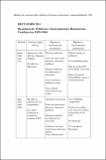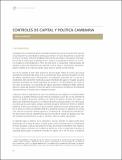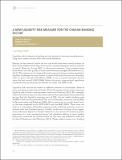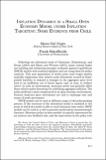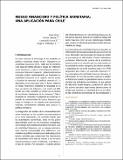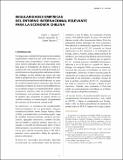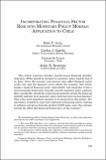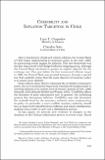Search
Now showing items 1-10 of 10
Controles de capital y política cambiaria
El análisis empírico de este estudio sugiere que un objetivo de política cambiaria y el temor de un sobrecalentamiento de la economía nacional han sido los dos motivos más importantes para la (re) introducción y persistencia de los controles de capital de la última década. Los controles de capital se ...
Trilemmas and tradeoffs: living with financial globalization
This paper evaluates the capacity of emerging market economies (EMEs) to moderate the domestic impact of global financial and monetary forces through their own monetary policies. I present the case that those EMEs able to exploit a flexible exchange rate are far better positioned than those that devote ...
A new liquidity risk measure for the Chilean banking sector
El objetivo de este trabajo es construir una medida apropiada del riesgo de liquidez para los bancos Chilenos. Ya existen varias medidas de riesgo de liquidez en la literatura, la mayoría basada en supuestos específicos y en opiniones de expertos. Con el fin de superar los posibles problemas de hacer ...
Inflation dynamics in a small open economy model under inflation targeting: some evidence from Chile
Following the influential work of Christiano, Eichenbaum, and Evans (2005) and Smets and Wouters (2003), many central banks are building and estimating dynamic stochastic general equilibrium (DSGE) models with nominal rigidities and are using them for policy analysis. This new generation of sticky ...
Riesgo financiero y política monetaria: una aplicación para Chile
Este estudio construye un modelo para la vulnerabilidad del sector financiero y lo integra a un marco macroeconómico de uso común en el análisis de política monetaria. La principal interrogante que se espera responder con el modelo integrado es si los bancos centrales deberían o no incluir en forma ...
Regularidades empíricas del entorno internacional relevante para la economía Chilena
En el presente estudio se analizan regularidades macroeconómicas dentro de los grandes bloques económicos (EE.UU., Europa y Japón) y se describe la interacción entre variables relevantes de estos bloques y su relación con variables de interés para la economía Chilena como precios de productos básicos, ...
Incorporating financial sector risk into monetary policy models: application to Chile
This article analyzes whether market-based financial stability indicators (FSIs) should be included in monetary policy models and, if so, how. Since the economy and interest rates affect financial sector credit risk, and the financial sector affects the economy, this article builds a model of financial ...
Inflation targeting under political pressure
Historically, many emerging economies, particularly in Latin America, battled against persistently high and volatile inflation. Today, emerging economies continue to experience higher inflation than developed ones, and their central banks deviate more frequently from inflation targets. These patterns ...
Credibility and inflation targeting in Chile
After a long history of high and volatile inflation, the Central Bank of Chile began implementing its monetary policy in the early 1990s by announcing yearly targets for inflation. This new framework was the first step toward a full-fledged inflation-targeting setup, although the Central Bank continued ...

